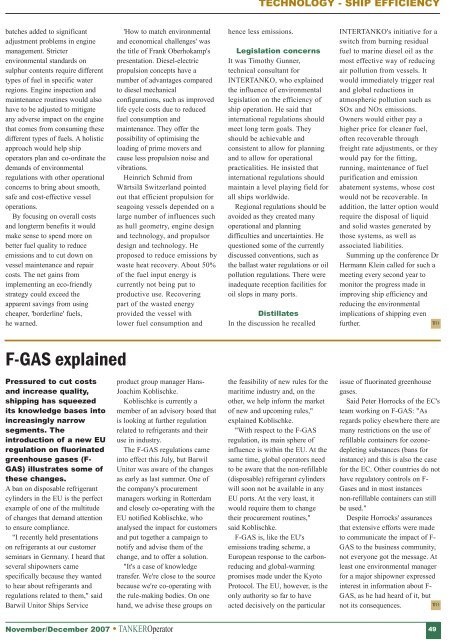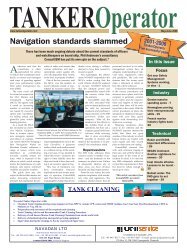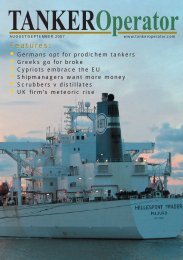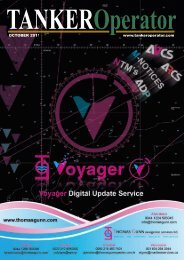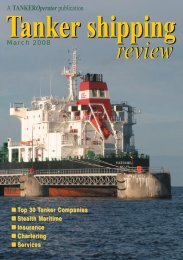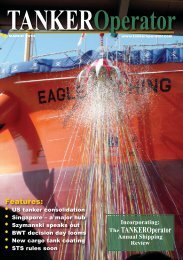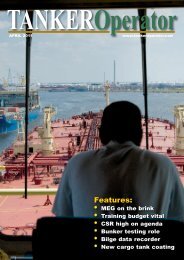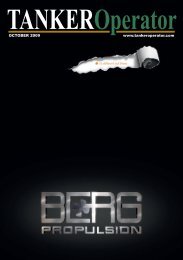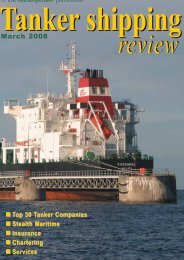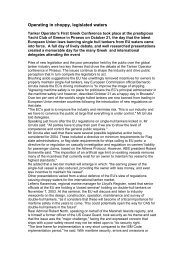You also want an ePaper? Increase the reach of your titles
YUMPU automatically turns print PDFs into web optimized ePapers that Google loves.
atches added to significant<br />
adjustment problems in engine<br />
management. Stricter<br />
environmental standards on<br />
sulphur contents require different<br />
types of fuel in specific water<br />
regions. Engine inspection and<br />
maintenance routines would also<br />
have to be adjusted to mitigate<br />
any adverse impact on the engine<br />
that comes from consuming these<br />
different types of fuels. A holistic<br />
approach would help ship<br />
operators plan and co-ordinate the<br />
demands of environmental<br />
regulations with other operational<br />
concerns to bring about smooth,<br />
safe and cost-effective vessel<br />
operations.<br />
By focusing on overall costs<br />
and longterm benefits it would<br />
make sense to spend more on<br />
better fuel quality to reduce<br />
emissions and to cut down on<br />
vessel maintenance and repair<br />
costs. The net gains from<br />
implementing an eco-friendly<br />
strategy could exceed the<br />
apparent savings from using<br />
cheaper, 'borderline' fuels,<br />
he warned.<br />
F-GAS explained<br />
Pressured to cut costs<br />
and increase quality,<br />
shipping has squeezed<br />
its knowledge bases into<br />
increasingly narrow<br />
segments. The<br />
introduction of a new EU<br />
regulation on fluorinated<br />
greenhouse gases (F-<br />
GAS) illustrates some of<br />
these changes.<br />
A ban on disposable refrigerant<br />
cylinders in the EU is the perfect<br />
example of one of the multitude<br />
of changes that demand attention<br />
to ensure compliance.<br />
"I recently held presentations<br />
on refrigerants at our customer<br />
seminars in Germany. I heard that<br />
several shipowners came<br />
specifically because they wanted<br />
to hear about refrigerants and<br />
regulations related to them," said<br />
Barwil Unitor Ships Service<br />
'How to match environmental<br />
and economical challenges' was<br />
the title of Frank Oberhokamp's<br />
presentation. Diesel-electric<br />
propulsion concepts have a<br />
number of advantages compared<br />
to diesel mechanical<br />
configurations, such as improved<br />
life cycle costs due to reduced<br />
fuel consumption and<br />
maintenance. They offer the<br />
possibility of optimising the<br />
loading of prime movers and<br />
cause less propulsion noise and<br />
vibrations.<br />
Heinrich Schmid from<br />
Wärtsilä Switzerland pointed<br />
out that efficient propulsion for<br />
seagoing vessels depended on a<br />
large number of influences such<br />
as hull geometry, engine design<br />
and technology, and propulsor<br />
design and technology. He<br />
proposed to reduce emissions by<br />
waste heat recovery. About 50%<br />
of the fuel input energy is<br />
currently not being put to<br />
productive use. Recovering<br />
part of the wasted energy<br />
provided the vessel with<br />
lower fuel consumption and<br />
product group manager Hans-<br />
Joachim Koblischke.<br />
Koblischke is currently a<br />
member of an advisory board that<br />
is looking at further regulation<br />
related to refrigerants and their<br />
use in industry.<br />
The F-GAS regulations came<br />
into effect this July, but Barwil<br />
Unitor was aware of the changes<br />
as early as last summer. One of<br />
the company's procurement<br />
managers working in Rotterdam<br />
and closely co-operating with the<br />
EU notified Koblischke, who<br />
analysed the impact for customers<br />
and put together a campaign to<br />
notify and advise them of the<br />
change, and to offer a solution.<br />
"It's a case of knowledge<br />
transfer. We're close to the source<br />
because we're co-operating with<br />
the rule-making bodies. On one<br />
hand, we advise these groups on<br />
TECHNOLOGY - SHIP EFFICIENCY<br />
hence less emissions.<br />
Legislation concerns<br />
It was Timothy Gunner,<br />
technical consultant for<br />
INTERTANKO, who explained<br />
the influence of environmental<br />
legislation on the efficiency of<br />
ship operation. He said that<br />
international regulations should<br />
meet long term goals. They<br />
should be achievable and<br />
consistent to allow for planning<br />
and to allow for operational<br />
practicalities. He insisted that<br />
international regulations should<br />
maintain a level playing field for<br />
all ships worldwide.<br />
Regional regulations should be<br />
avoided as they created many<br />
operational and planning<br />
difficulties and uncertainties. He<br />
questioned some of the currently<br />
discussed conventions, such as<br />
the ballast water regulations or oil<br />
pollution regulations. There were<br />
inadequate reception facilities for<br />
oil slops in many ports.<br />
Distillates<br />
In the discussion he recalled<br />
the feasibility of new rules for the<br />
maritime industry and, on the<br />
other, we help inform the market<br />
of new and upcoming rules,"<br />
explained Koblischke.<br />
"With respect to the F-GAS<br />
regulation, its main sphere of<br />
influence is within the EU. At the<br />
same time, global operators need<br />
to be aware that the non-refillable<br />
(disposable) refrigerant cylinders<br />
will soon not be available in any<br />
EU ports. At the very least, it<br />
would require them to change<br />
their procurement routines,"<br />
said Koblischke.<br />
F-GAS is, like the EU's<br />
emissions trading scheme, a<br />
European response to the carbonreducing<br />
and global-warming<br />
promises made under the Kyoto<br />
Protocol. The EU, however, is the<br />
only authority so far to have<br />
acted decisively on the particular<br />
INTERTANKO's initiative for a<br />
switch from burning residual<br />
fuel to marine diesel oil as the<br />
most effective way of reducing<br />
air pollution from vessels. It<br />
would immediately trigger real<br />
and global reductions in<br />
atmospheric pollution such as<br />
SOx and NOx emissions.<br />
Owners would either pay a<br />
higher price for cleaner fuel,<br />
often recoverable through<br />
freight rate adjustments, or they<br />
would pay for the fitting,<br />
running, maintenance of fuel<br />
purification and emission<br />
abatement systems, whose cost<br />
would not be recoverable. In<br />
addition, the latter option would<br />
require the disposal of liquid<br />
and solid wastes generated by<br />
those systems, as well as<br />
associated liabilities.<br />
Summing up the conference Dr<br />
Hermann Klein called for such a<br />
meeting every second year to<br />
monitor the progress made in<br />
improving ship efficiency and<br />
reducing the environmental<br />
implications of shipping even<br />
further.<br />
TO<br />
issue of fluorinated greenhouse<br />
gases.<br />
Said Peter Horrocks of the EC's<br />
team working on F-GAS: "As<br />
regards policy elsewhere there are<br />
many restrictions on the use of<br />
refillable containers for ozonedepleting<br />
substances (bans for<br />
instance) and this is also the case<br />
for the EC. Other countries do not<br />
have regulatory controls on F-<br />
Gases and in most instances<br />
non-refillable containers can still<br />
be used."<br />
Despite Horrocks' assurances<br />
that extensive efforts were made<br />
to communicate the impact of F-<br />
GAS to the business community,<br />
not everyone got the message. At<br />
least one environmental manager<br />
for a major shipowner expressed<br />
interest in information about F-<br />
GAS, as he had heard of it, but<br />
not its consequences.<br />
TO<br />
November/December 2007 � TANKER<strong>Operator</strong> 49


